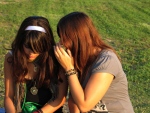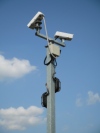Here are several research reports on kids’ behaviour online.
Read MorePhoto by Andras Vas on Unsplash
Photo by Andras Vas on Unsplash
Here are several research reports on kids’ behaviour online.
Read MoreFake news in the 17th century?
With Safer Internet Day just around the corner, the latest issue of Digital Education contains several links to resources and reports.
Read MorePicture from Tony Netone
The technology may have changed, but children don't.
Read More Here are three short observations on data, which may provide a basis for discussion with pupils.
Here are three short observations on data, which may provide a basis for discussion with pupils.
A few weeks ago I went to the Ice Age art exhibition at the British Museum.
 Should schools have Acceptable Use Policies? The following article was originally published in April 2008. Apart from the references to the ‘recent’ Byron Review and to Becta, it still seems very apposite to me. If I were writing the article today, I’d bring in Responsible Use Policies, but otherwise I believe it still stands. What do you think?
Should schools have Acceptable Use Policies? The following article was originally published in April 2008. Apart from the references to the ‘recent’ Byron Review and to Becta, it still seems very apposite to me. If I were writing the article today, I’d bring in Responsible Use Policies, but otherwise I believe it still stands. What do you think?
One of the things recommended by the recent Byron Review into keeping children safe in a digital world was for schools to have acceptable use policies
The time: Now
Teacher: So, class, that’s your homework for today.
Boy at the back: You can’t do that, Sir. I know my rights.
T: Er, sorry, I can’t do what exactly?
BATB: Set us that homework, Sir.
T: Why not?
BATB: ‘Cos it will take about half an hour, Sir, and you’re only allowed to give us 20 minutes. I know my rights.
T: OK, do 20 minutes this evening, and 10 minutes tomorrow evening.
BATB: You can’t tell me that, Sir.
T: OK, and why not?
BATB: Cos I have a right to a private life under Article 8 of the European Convention of Human Rights, Sir. I know my rights.
Lights dim as the characters continue arguing. Exeunt.
 Her Majesty The Queen of England serves as an inspirational role model in terms of personal privacy. Despite being in the public eye for 60 years, she has managed to keep her personal opinions to herself. Almost nobody knows, for example, what her favourite tea is (although Smokey Earl Grey has been hinted at). Yet there are many people who seem to announce to the world each time they blow their nose!
Her Majesty The Queen of England serves as an inspirational role model in terms of personal privacy. Despite being in the public eye for 60 years, she has managed to keep her personal opinions to herself. Almost nobody knows, for example, what her favourite tea is (although Smokey Earl Grey has been hinted at). Yet there are many people who seem to announce to the world each time they blow their nose!
The balance between public and private is, of course, a personal choice, and one made more difficult by other people openly talking about one’s activities or tagging one’s photos, and much standard business advice. But if you do want to be fairly private while maintaining a strong online presence, here are some suggestions. You may like to share and discuss these with students, who are also striving to get this balance correct.
 Concentrating purely on web filtering to keep kids safe online is a bit like looking for your keys under a lamp post because, although you lost them somewhere else, it’s lighter there. A third of children in Europe access the internet from a mobile device, according a new report:
Concentrating purely on web filtering to keep kids safe online is a bit like looking for your keys under a lamp post because, although you lost them somewhere else, it’s lighter there. A third of children in Europe access the internet from a mobile device, according a new report:
33 % of 9 to 16 year-olds who go online say they do so using a mobile phone or other handheld device.
 I overheard a great conversation yesterday. Two girls were chatting behind me in the queue in the Post Office. From their discussion about school options and examinations, I’d say they were around 14 and 15 years old. Here’s part of the conversation, it really made me smile.
I overheard a great conversation yesterday. Two girls were chatting behind me in the queue in the Post Office. From their discussion about school options and examinations, I’d say they were around 14 and 15 years old. Here’s part of the conversation, it really made me smile.

If you wouldn't say it in person, why say it online?
The National Crime Prevention Council in the USA has addressed cyberbullying in a number of short videos. They make the point very well: why behave differently online to how you would conduct yourself offline?
There's another, perhaps less obvious, message that comes across when you watch the videos. To quote from Edmund Burke ,
The only thing necessary for the triumph of evil is for good men to do nothing.
Use this as a starting point for discussion with pupils. Perhaps they could make their own cyberbullying video too: that approach has been used to great effect in a number of schools.
I'm preparing a talk on the pros and cons of social networking, with some tips on keeping safe. The talk is going to be to a group of 6th formers (ie 17-18 year olds).
I've been doing my own research to see how many social networks these youngsters belong to, and it turns out to be a modest 2 or 3 on average. Then I made a list of the ones I belong to, and had a bit of a shock.
I currently belong to -- wait for it -- 63 social networks. I say "currently" because I am about to join more, and look at another one without joining it, to see what they have to offer. The reason I don't wish to join the second one is that it's for teenage girls. (I'll come on to why I'd want to look into such a network in a second.)
Of course, it all depends on how you define "social networking". The website What is Social Networking says:
"Social networking is the grouping of individuals into specific groups, like small rural communities or a neighborhood subdivision, if you will."
That sounds pretty accurate, although I'm inclined to go further. I come from an Economics background, and I quite like the economist's definition of money:
"Money is as money does."
It takes a bit of getting used to at first, but actually it's a succinct version of the observation by Douglas Adams:
"If it looks like a duck, and quacks like a duck, we have at least to consider the possibility that we have a small aquatic bird of the family anatidae on our hands."
So, applied to social networking: if it looks like a social network and people behave in it as though it were a social network, then it's probably a social network.
On that basis I have lumped together a whole load of applications that enable me to post messages, see other people's messages, comment on those messages, share files and follow or befriend people. In other words, I've included social bookmarking applications, video sharing websites, general social networks like Facebook, specific or focused social networks like Wired Journalists, and what I suppose we might call quasi-social networks like Friends Reunited.
Why is any of this important? Before I go into that, let me just explain why I'd want to look at a teenage girls social network -- and I can assure you that it is not for the sort of reasons you might think! I was reading in an article on social networking in Information Age about the benefits to business of social networking, and it mentioned a site called BeingGirl, maintained by Procter and Gamble. The article states:
"The same technologies can be applied in a marketing capacity. Involving customers and prospects in a community built around products and brands is proving to be a powerful way to maintain loyalty and engagement.
Procter & Gamble is one notable leader here with its BeingGirl website. The social network provides an environment in which young girls discuss and get answers on many of the awkward topics that arise as they enter their early teenage years, with P&G introducing marketing material for its relevant products at pertinent points."
So I am interested in questions like, does this look like a genuinely useful site for girls? What's the product placement actually like? Is one of the things we should be educating kids about the fact that product placement goes on (including in television programmes)?
I'm coming at this from a number of angles.
Firstly, I see nothing wrong in companies deciding to start a social network in order to engender customer loyalty. Ten years ago I signed up to The Beano website. The Beano is a comic which has been part of the British comic landscape for what seems like forever, and is full of cartoon strips that are so stupid as to be hilarious. Now, the Beano website had all sorts of silly features on it, and it was just a good laugh. And it was an example of product placement.
Another example: I myself started a social networking site called ICT in Education. I stopped promoting it or nurturing it because I felt that it was actually diverting attention from my main website -- although I haven't shut it down because there are nearly 200 members who may be upset if I did so. Given that I often mentioned my articles in discussions where I felt such a reference would be useful to people, that was a vehicle for product placement too.
Secondly, issues like product placement have always been important. Or, to put it more generally, media literacy has always been important to teach. Right from the time I started teaching I made it clear to my students that they should always look not just at what is being said, but who is saying it, and what they're not saying. Nothing new about that.
Thirdly, if people find a social networking site like BeingGirl useful and helpful, and the products are good, that's what's known as "good customer service" isn't it?
So what does this have to do with my talk?
Well, it seems to me that a question like "What are the pros and cons of social networks?", and the supplemental question "And how do you keep safe in them?" raise a number of issues. Taking the first one first:
In addition, the answer will depend on:
As for the pros and cons of social networking sites in general, for me it's the same as the pros and cons of social networking, ie interacting with other people, per se.
The answer to the second question, about safety, must partly depend on how one defines "safety". Everyone seems to think in terms of sexual predators, but without wishing to denigrate the importance of that in any way, it does strike me as a somewhat narrow definition. What about identity theft? What about safety from economic predators?
(I was looking at a website this morning on which people can post their stories and articles and earn a share of the advertising revenue. The "small print" says that the site owners reserve the exclusive right to use your work forever, and also to do with it as they like, including chopping it up, featuring it anywhere they like, and so on. Loads of people have posted their stuff on this site, thereby depriving themselves of other sources of income from that work in the future. I hope their earnings from the advertising revenue compensate them for that cost. Shouldn't we be making sure that youngsters are aware of the importance of not selling the family jewellery as it were?)
What about protecting your reputation, or ensuring the "safety" of your future job prospects?
As for why I belong to so many: it's because they mostly do different things. Where I am a member of two or three that do the same thing, it's because I like to try things out. And, to be honest, I'm active in only about three or four of them. Let's face it: if I were active in all of them I'd be spending at least a day a week socially networking online!
I guess that's one of the big disadvantages of social networking: it can be so time-consuming!
This article was first published on 3rd February 2009.
This was originally published as a news item in July 2006, but I think the principles still apply.
Well, the US House of Representatives has ratified the Deleting Online Predators Act (DOPA), which was originally passed in May, and which bans access by minors to any website which involves creating a profile.
In other words, the Act is so broadly crafted as to, in effect, ban almost any useful website, blog, or collaborative learning and social web spaces from schools. So how's that as a way of dealing with online predator issues?
There's no point in rehearsing all the arguments here, but one thing I would say is that we in the UK need to watch developments closely. It has long been the case that what America does today, the UK does tomorrow. "Tomorrow" used to be around 20 years' time, but these days the time lag is much shorter. Moreover, it used to be the case that this process happened naturally. Unfortunately, the "special relationship" now seems to entail us constantly looking at what the Americans are doing in education in order to see if we could adopt it here.
I don't wish to come across as xenophobic against the USA -- I have friends, family and colleagues there, and I travel there at every available opportunity -- but I do think we need to be somewhat more discriminating than we sometimes are in adopting American ideas. I am concerned that some bright spark in the DfES, fresh out of university (Oxbridge, of course), with no clue as to how the real world works, will decide that banning everything that might attract perverts is a great idea.
In fact, this head-burying approach could, if anything, lead to more and worse cases of online predation, if it leads schools into a false sense of security and makes them pay even less attention to these issues than they do now. Specifically, I am referring to the responsibility of children themselves, and parents. I am constantly amazed that, despite everything you hear, every so often another teenaged girl goes missing after meeting a man 3 times her age whom she met on the internet.
In the long term, the only real defence against online predation in my opinion is to make it compulsory for schools to address online safety issues in the following ways:
Actually, the same goes for teachers: if you're not a technology co-ordinator, that does not mean you are not responsible for observing what the students coin your class are up to.
(You would not believe the number of times I have to say to school administrators, "That is a child protection issue, not an educational technology issue.")
In fact, there is probably a case for arguing that, had the US House of Representatives had more confidence in schools' parents' and students' ability and willingness to address online safety issues in practical ways, perhaps they would not have felt the need to pass this legislation.
Further information.
On this subject, the Department for Education & Skills in England has just issued guidance about cyberbullying. You can find that here:
http://www.dfes.gov.uk/bullying/
It also includes a couple of videos. The "don't suffer in silence" video is quite powerful in its own way, but both it and the other one, which is basically a poem, needs to form part of a controlled discussion activity to be truly effective.
Recent research in the UK suggests that over 20% of children have experienced cyberbullying. Now, this is interesting:
"Phone calls, text messaging and emailing were the most common forms of cyber bullying both inside and outside of school, while chat-room bullying was the least common. The prevalence of cyber bullying was greater outside school than in school."
If that is also true in the USA, then DOPA is doubly dangerous because it will make people think these issues have been dealt with when they have been hardly touched. A bit like arresting the wrong person for a series of murders, leaving everyone in the area with a false sense of security because the actual murderer is still on the loose.
I haven't yet read the report in its entirety, but from what I've seen it is worth looking at and discussing with colleagues.
See here for the full report:
http://www.antibullyingalliance.org/documents/CyberbullyingreportFINAL230106_000.pdf
and here for the summary:
http://www.antibullyingalliance.org/documents/Cyberbriefing.pdf
DOPA
cyberbullying
(c) Terry Freedman All Rights Reserved